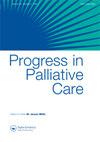Compassionate community connectors: a distinct form of end-of-life volunteering
IF 0.8
Q4 PUBLIC, ENVIRONMENTAL & OCCUPATIONAL HEALTH
引用次数: 4
Abstract
Public health approaches to palliative care have long promoted the contribution of formal and informal volunteering to providing effective end-of-life care in neighbourhoods and communities. A central strategy for this is a ‘compassionate communities’ approach that focuses on building care networks and developing community members’ capacities in end-of-life care. There is anecdotal evidence of differences in the motivations and life experiences of traditional palliative care volunteers and volunteers in compassionate community programs. There is however very little research into volunteers seeking a compassionate communities orientated role. This study describes the motivations, experiences and characteristics of volunteers participating in a program called compassionate connectors in Western Australia. Twenty volunteers with a variety of caregiving experiences participated in the pilot study through submitting an expression of interest for recruitment. Analysis indicated that the compassionate community connector role attracted experienced community volunteers who were already familiar with community services and end-of-life supports in their community, demonstrating a pre-existing understanding of the practical and emotional supports families may need for end-of-life care. They articulated some key differences with the hospice/palliative care volunteers and how they wish to engage in fresh ways with their community and move beyond traditional volunteering to exercise more autonomy in providing care. This article argues that clarifying these characteristics will benefit new compassionate community initiatives and provide important information for hospice and palliative care services that may be considering undertaking compassionate community projects. Conceptual clarity about these differing roles will be helpful for all collaborations and partnerships that involve volunteer recruitment and management.富有同情心的社区连接者:一种独特的临终志愿服务形式
长期以来,姑息治疗的公共卫生方法一直促进正式和非正式志愿服务对在社区和社区提供有效的临终关怀的贡献。这方面的核心战略是“富有同情心的社区”方法,重点是建立护理网络和发展社区成员在临终关怀方面的能力。有传闻证据表明,传统姑息治疗志愿者和富有同情心的社区项目志愿者的动机和生活经历存在差异。然而,很少有人对志愿者寻求以社区为导向的富有同情心的角色进行研究。这项研究描述了在西澳大利亚参加一项名为“同情连接器”项目的志愿者的动机、经历和特点。20名具有各种护理经验的志愿者通过提交招聘意向书参与了试点研究。分析表明,富有同情心的社区连接者角色吸引了经验丰富的社区志愿者,他们已经熟悉社区的社区服务和临终关怀,这表明他们对家庭可能需要的临终关怀的实际和情感支持有着预先存在的了解。他们阐述了与临终关怀/姑息治疗志愿者的一些关键差异,以及他们希望如何以新的方式与社区接触,超越传统的志愿服务,在提供护理方面行使更多的自主权。本文认为,澄清这些特征将有利于新的同情社区倡议,并为可能考虑开展同情社区项目的临终关怀和姑息治疗服务提供重要信息。明确这些不同角色的概念将有助于所有涉及志愿者招募和管理的合作和伙伴关系。
本文章由计算机程序翻译,如有差异,请以英文原文为准。
求助全文
约1分钟内获得全文
求助全文
来源期刊

PROGRESS IN PALLIATIVE CARE
PUBLIC, ENVIRONMENTAL & OCCUPATIONAL HEALTH-
CiteScore
2.60
自引率
11.80%
发文量
24
期刊介绍:
Progress in Palliative Care is a peer reviewed, multidisciplinary journal with an international perspective. It provides a central point of reference for all members of the palliative care community: medical consultants, nurses, hospital support teams, home care teams, hospice directors and administrators, pain centre staff, social workers, chaplains, counsellors, information staff, paramedical staff and self-help groups. The emphasis of the journal is on the rapid exchange of information amongst those working in palliative care. Progress in Palliative Care embraces all aspects of the management of the problems of end-stage disease.
 求助内容:
求助内容: 应助结果提醒方式:
应助结果提醒方式:


